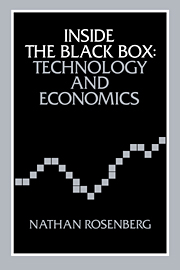Book contents
- Frontmatter
- Contents
- Preface
- Part I Views of technical progress
- Part II Some significant characteristics of technologies
- 3 Technological interdependence in the American economy
- 4 The effects of energy supply characteristics on technology and economic growth
- 5 On technological expectations
- 6 Learning by using
- 7 How exogenous is science?
- Part III Market determinants of technological innovation
- Part IV Technology transfer and leadership: the international context
- Index
7 - How exogenous is science?
Published online by Cambridge University Press: 08 January 2010
- Frontmatter
- Contents
- Preface
- Part I Views of technical progress
- Part II Some significant characteristics of technologies
- 3 Technological interdependence in the American economy
- 4 The effects of energy supply characteristics on technology and economic growth
- 5 On technological expectations
- 6 Learning by using
- 7 How exogenous is science?
- Part III Market determinants of technological innovation
- Part IV Technology transfer and leadership: the international context
- Index
Summary
I begin by recalling Kuznets's view that the distinctive feature of modern industrial societies is their success in applying systematized knowledge to the economic sphere, knowledge derived from scientific research. This view has the disconcerting aspect, at least for the economist, of appearing to make the central feature of modern economic growth an exogenous phenomenon. If that is really the way the world is, then we ought to acknowledge it gracefully and accept the fact that the major determinants of a central economic phenomenon lie outside the economists' range of analysis. Economists have many reasons for humility these days, and perhaps one additional reason will not be too marginally burdensome.
On the other hand, perhaps we do not need to be quite so humble. Perhaps if we do not insist on too restrictive a definition of the subject matter of our discipline, it may be possible to identify significant chains of causation running from economic life to science as well as from science to economic life. This is in fact what I propose to do. My argument turns, first, upon admitting technology into the arena of economic variables. Economists have had much more success in dealing with the consequences of technological change than with its determinants. Nevertheless, the extensive labors of Schmookler, Griliches, Mansfield and others provide sufficient warrant for admitting technology into the arena of phenomena about which economists have intelligent–and perhaps even useful–things to say.
- Type
- Chapter
- Information
- Inside the Black BoxTechnology and Economics, pp. 141 - 160Publisher: Cambridge University PressPrint publication year: 1983
- 2
- Cited by



